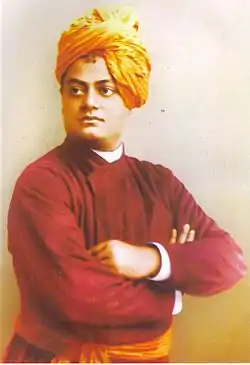Vivekananda Kendra
Vivekananda Kendra is a social organisation. Closely affiliated with the Rashtriya Swayamsevak Sangh, it was founded by Eknath Ranade to commemorate the arrival of Swami Vivekananda at the rock at Kanyakumari where he sat and meditated for three days in 1892.[1][2][3][4][5][6][7]
| Formation | 7 January 1972 |
|---|---|
| Legal status | Active |
| Headquarters | Kanyakumari, Tamil Nadu, India |
Region served | India |
Parent organization | Rashtriya Swayamsevak Sangh |
| Affiliations | Sangh Parivar |
| Website | www.vrmvk.org |
It was founded on 7 January 1972 in Kanyakumari, India by Eknath Ranade, a senior pracharak of the Rashtriya Swayamsevak Sangh, left responsibility in July 1963, and engaged himself in building Memorial of Swami Vivekananda, which was inaugurated on 2 September 1970 by Shri V.V. Giri, President of India in presence of Srimat Swami Vireshwaranandaji, President of RamKrishna Mission. Its current president is A.Balakrishnan.The organisation has constructed a solid waste management and bio-gas plant in Mahabalipuram.[8]
Vivekananda Kendra received the Gandhi Peace Prize for 2015 for their contribution to rural development, education, development of natural resources.[9]
Vivekananda Kendra launched Nationwide Sampark Program "Ek Bharat Vijayi Bharat" on 50th Year of Vivekananda Rock Memorial, by meeting the current President Shri Ram Nath Kovid on 2 September 2019, followed by Vice President & Prim Minister and plan to meet each state's Governor & Chief Minister, and all strata of Society and common people of India, who contributed ₹80.00,000/- by donating ₹1 coupon in '60s and all state Government contributed ₹1.00,000/-.
References
- Pandya, Samta P. (9 July 2014). "The Vivekananda Kendra in India: Its ideological translations and a critique of its social service". Critical Research on Religion. 2 (2): 116–133. doi:10.1177/2050303214534999. ISSN 2050-3032. S2CID 143748202.
- Beckerlegge, Gwilym (1 March 2010). "'An ordinary organisation run by ordinary people': a study of leadership in Vivekananda Kendra". Contemporary South Asia. 18 (1): 71–88. doi:10.1080/09584930903561689. ISSN 0958-4935. S2CID 145311756.
- Beckerlegge, Gwilym (4 December 2013). "Eknath Ranade, Gurus, and Jīvanvratīs: the Vivekananda Kendra's Promotion of the "Yoga Way of Life"". In Singleton, Mark; Goldberg, Ellen (eds.). Gurus of Modern Yoga. Oxford University Press. doi:10.1093/acprof:oso/9780199938704.001.0001. ISBN 9780199345892.
- Kanungo, Pralay (30 June 2012). "Fusing the Ideals of the Math with the Ideology of the Sangh? Vivekananda Kendra, Ecumenical Hinduism and Hindu Nationalism". In Zavos, John (ed.). Public Hinduisms. Hinduism in India. SAGE Publications. ISBN 9788132107408.
- "Attempts at appropriation". frontline.thehindu.com. Retrieved 7 November 2019.
- Chatterji, Angana P. (24 July 2016). "The Biopolitics of Hindu Nationalism: Mournings". Cultural Dynamics. doi:10.1177/0921374004047753. S2CID 145785904.
- Pandya, Samta P (24 April 2015). "Governmentality and guru-led movements in India". European Journal of Social Theory. 19 (1): 74–93. doi:10.1177/1368431015579977. ISSN 1368-4310. S2CID 147428389.
- "Power from waste: Vivekananda Kendra shows the way". The Hindu. Tamil Nadu, India. 7 September 2011.
- "President confers Gandhi Peace Prize". All India Radio. 26 February 2019.
Further reading
- Pandya, Samta (2014). "Seva and Institution Building in Hindu Inspired Faith Movements". Global Journal of Human-Social Science Research. 14 (3).
